I’ve made no secret about my views on a controversial period of American history: when thirteen states seceded from the American Union, formed a confederation, adopted a constitution, were invaded, were conquered, and were forced back into the Union - a Union transformed by the experience into a centralized nation.
In their ignorance of both history and historiography, some people argue that defending the seceded states - and the soldiers and civilians of the Confederate States of America in the subsequent war - is intolerable and must be excluded in today’s tolerant and inclusive culture. This is even true in the church, and in my own conservative church body, the Lutheran Church - Missouri Synod (LCMS) - as I’ll occasionally be subject to whispering campaigns, or outright calls for me to be reigned-in, forced to conform to the Official Narrative (sometimes called the Righteous Cause Myth), or else I should be defrocked.
It’s my understanding that someone recently publicly complained to our synod president (the equivalent of our archbishop) about pastors being pro-Confederate, as if this is not compatible with our faith and life and ministerial service.
I serve an LCMS parish in the Deep South of Louisiana. Many of my parishioners share my view of their Confederate ancestors and of our state’s history of secession, confederation, conquest, occupation, and eventual re-integration into the Union. My congregation was founded during Reconstruction (interestingly established originally as a German-speaking Northern Presbyterian congregation by a Federal Army chaplain). At that time, Federal occupation troops lined the street where I currently live and serve - guarding the railroad tracks. Confederate history and remembrance is everywhere in our region and locale.
Some of my parishioners (and I) were present for the demonstrations and vigils held in New Orleans at the sites of the Confederate monuments that were removed in 2017. One of my parishioners gave me a gift of a figurine of Robert E. Lee. Another parishioner displayed a Confederate flag at her business. It is part of who we are. I don’t expect the midwestern majority of our church body to resonate with this reality, especially given the historiography taught in our schools.
After violence erupted, I showed up quickly, vested, and conducted a Vespers service, praying for peace in the midst of the multi-ethnic and multi-racial defenders of the monuments, who came from all walks of life. Sadly, no other clergy were present on the other side of the barricades to pray for peace. Instead, from them, we were subjected to racial and ethnic slurs, epithets, profanities, hatred, and blasphemy. I urged monument supporters to remain calm, and not take the bait and become violent. I’m glad they listened.
As I said, I understand the reality that midwesterners are not likely to realize, let alone understand, how we view our history and heritage in Dixie. As an ethnic Southerner, born and raised in the midwest, I get it. I went to a grade school named in honor of Abraham Lincoln, whose portrait was in every classroom. I was taught the standard historiography of the “Civil War” in school. But I also had lots of contact with my grandparents - all of whom were (West) Virginians. In particular, I spent a lot of time with my great-grandmother, a remarkable woman who was born in 1900 in West Virginia. Her paternal grandfather (whom she knew) was born in 1839. He was a Union veteran who served in the Federal army during the War Between the States as part of the 10th West Virginia Infantry. He was an outlier, as his brothers served in the Confederate Army of Northern Virginia under Lee and Jackson as part of the 25th Virginia infantry. Her family was literally a case of brother-against-brother.
My great-grandmother gave me some Confederate money. She told me about her grandfather and granduncles. And as a boy, this puzzled me. Why would my family fight for the “bad guys”? Why did they want to preserve slavery? My people were poor farmers who didn’t own any slaves. And it wasn’t until I started reading American history on my own - outside of the safe-space narrative of the public school system - that I learned that there were indeed two sides of the story, and there was much more to it than what I was taught in the 1970s.
And this is why we have wars. If everyone agreed and thought in lockstep regarding history and historiography, on matters of property ownership and nationhood, on laws and the Constitution - there would never be wars, let alone debates in Congress, or even smaller interpersonal conflicts. And regardless of where one stands on these matters, it is helpful to understand, and to be able to explain, the other side.
I changed my mind about my Confederate ancestors being the “bad guys.” I didn’t just study battles and generals, I dug into the “why” of the conflict: the political philosophy, the legal theories, and the economics. And for me, it wasn’t simply academic curiosity. As I said, this was personal. One of my uncles (the one who survived the war) lived to old age, and his diary from the war is interesting reading, a true primary source of my family’s story and of American history. And this idea of remembrance is not just about my family’s past, but also its present. It is who we are.
I joined the Sons of Confederate Veterans some 35 years ago. It is a genealogical society, and more. After the war, the Union veterans (like my great-great-great-grandfather) joined the Grand Army of the Republic (GAR). As a result of their lobbying, Union veterans received pensions and benefits that come with winning wars and having political clout. In fact, my Union veteran great-great-great grandfather apparently died after having a heart attack in the White House. He held a civil service job with the US treasury. My Confederate uncles, however, and all of their compatriots, had no such benefits. The impoverished Southern States could not afford to pay them pensions for many years. Ken Burns, in his documentary “The Civil War” (which was hostile to the Southern side of the story) pointed out that in 1866, a fifth of the decimated state budget of Mississippi was consumed by supplying artificial limbs to amputee veterans.
If the Confederate veterans were to have health care, convalescent and nursing homes, or even monuments and grave markers - these had to be provided for privately. The United Daughters of the Confederacy (UDC) was formed in 1894 to provide for the aging veterans. And the veterans themselves had previously formed the United Confederate Veterans (UCV) in 1889 as a source of mutual support. The UCV had annual reunions until 1951, when the last of the veterans died off. The veterans brought their sons (and subsequent grandsons) into the reunions, and in 1896, organized them into an auxiliary: the Sons of Confederate Veterans. The SCV is the legal heir to the UCV, and it exists to this day, along with the UCD, as a keeper of artifacts, and of the first-person accounts of their ancestors. The National Confederate Museum in Columbia, Tennessee - which has recently been paid off - is a project of the SCV. So is the continuation of Confederate Veteran magazine.
I’m sure that most of the people who object to Christians flying Confederate flags, honoring their Confederate ancestors, and singing “Dixie,” would be clueless about this history and historiography - especially in this day and age of wokeness and of the popularity of accusing people of “white supremacy” and “racism.” Even in a conservative church body like mine, there is a small, but vocal, woke contingency - as well as people who are corralled into doing their bidding, even if unwittingly.
And I understand that there are different points of view, and that not everyone agrees with me. Some of my closest friends don’t. It simply stands to reason that there will be different historiographies and perspectives on this topic. We cannot even agree on modern historiography when it comes to the current wars and conflicts in Ukraine and Gaza. To try to shoehorn in a particular viewpoint regarding American history as a doctrine of Christianity is nothing more than bullying, and the misuse of our faith to a political end. It is especially repugnant when the worst construction is applied, and the argument is made that those who hold to a particular point of view must be racists, white supremacists, Nazis, or whatever the au courant term to vilify and demonize people is in vogue these days.
Speaking of which, I want to share some pictures of people that I have met, spoken with, and/or befriended over the years. See if you can figure out what they all have in common:
Give up? I know, it’s a trick question. You can’t tell what these people have in common just by looking at them. So I’ll give you the answer: I have met, conversed with, known, and/or have befriended all of them. And, they all agree with me on Confederate history and heritage.
Let me introduce them to you…
Nelson Winbush
I met Mr. Winbush in 1994 in Mobile, Alabama. He was born in 1929, and I believe that he is still living. He is a retired teacher and principal from Florida. He is the grandson of Louis Napoleon Nelson, who was a former slave of Lt. Gen. Nathan Bedford Forrest, C.S.A. In fact, he was one of the nearly fifty Forrest slaves who went off to war with him. Mr. Nelson served as a chaplain to the troopers, and served faithfully to the end of the war - as did all but one of the Forrest slaves. Of these men, General Forrest remarked, “Finer Confederates never fought.” Louis Nelson was fiercely loyal to General Forrest and the Confederate cause - and never missed a UCV reunion for the rest of his life.
And here is a picture of a very young Nelson Winbush attending a UCV reunion with his grandfather in the 1930s:
And here is an interesting article about Mr. Winbush.
Leonard Haynes
I met the late Dr. Leonard Haynes in 1995 in Danville, Virginia. We we both speaking at the same event: the dedication of a new Confederate monument at the site of the last Capitol of the Confederacy.
He was a professor at Southern University in Baton Rouge, LA. He is not to be confused with his son of the same name, who is also an accomplished professor.
He was born about 1923, and like Mr. Winbush, Dr. Haynes’s family was comprised of loyal Confederates during the War for Southern Independence. My adopted home state of Louisiana defies stereotypes:
We are not on English Common Law, but rather a form of Napoleon’s Civil Code.
We have parishes, not counties.
The French language enjoys a privileged status.
Our bilingual articles of secession never mention slavery.
The areas of our state that were the most pro-slavery were the most anti-secession, and vice versa.
Some of our richest antebellum plantation-owners, who had the most number of slaves, were black.
There is an amusing anecdote from the war concerning a Union officer who wanted to set up a Louisiana plantation for his headquarters. He knocked on the door. A black woman answered. The Union officer asked to speak with her mistress. “I am the mistress” was her reply.
Here is an article about Dr. Haynes.
And here are some pics from the event - including the last one of me at the podium. I have our speeches on videotape somewhere.
Walter Williams
Some of you may well know who Dr. Walter Williams is. He had a long and distinguished career at George Mason University in Fairfax, Virginia. He was the John M. Olin Distinguished Professor of Economics until his death in 2020 at the age of 84. He was a tireless defender of free markets and individual human liberty. Some people may remember him guest-hosting the Rush Limbaugh Show.
I met him in 1995 in Washington, DC. Because of his outspoken views on not only the Constitution, the Tenth Amendment, and State’s Rights - but also because of his defense of the Confederate cause - I presented him with a certificate of appreciation from the Sons of Confederate Veterans.
We had a lovely conversation, by which I learned more about his dedication to Confederate history and heritage. It turns out that he learned about Confederate history from his grandmother - who was a Virginian, a stanch supporter of the Confederate cause, and who had nothing nice to say about “Yankees.”
Dr. Williams was glad to receive the certificate, and he already had a Confederate flag on display in his office. To meet and converse with him was a banner day for me!
There are many great videos out there of Dr. Williams, including this one, in which he speaks to secession and the Confederate flag. And here is an interesting article as well.
H.K. Edgerton
I first met H.K. some time in the late 1990s or early 2000s. I don’t remember exactly when. He had been chairman of the Asheville, North Carolina chapter of the NAACP. But when the NAACP turned against Confederate symbols, he distanced himself from them.
Mr. Edgerton’s family also supported the Confederate States during its inception, the war for its defense, and it its historical aftermath. For more than 25 years, he has tirelessly spoken publicly in favor of Confederate history and heritage.
Here is an ironic picture of him being protested against by a white BLM activist:
And one of yours truly with my compatriot H.K.:
Andrew “Drew” Duncomb
I met Drew (aka “Black Rebel”) in New Orleans in 2017 during the removal of the city’s Confederate monuments. He had come from Oklahoma to support our Confederate history and heritage.
Unfortunately, I didn’t get to have much conversation with him, as the situation was chaotic, and continued to remain so for weeks. But I do have friends who know him well, and speak highly of him.
Here is another ironic and iconic picture: Drew being assaulted by Antifa protestors who are rather “non-melanated” (as the kids say).
He was later stabbed and nearly murdered by Antifa. It was a close call.
Bill
Bill is the only person I’m speaking about here whom I have not met personally (and I’m omitting his last name and protecting his privacy, since he’s not a public figure). He is a Facebook “friend.” He’s a retired military NCO and law enforcement guy. He is also a staunch conservative, American patriot, and defender of Confederate history and heritage, and in particular, the war memorials and forts named for Confederate heroes.
I really appreciate his writings and hope to meet him in person some day!
Wanjiru Njoya
I first met Dr. Wanjiru Njoya in Auburn, Alabama in 2023, where she delivered a tremendous paper: “Defending Private Property: Principles of Justice” (see video). She is a pastor’s daughter who was born in the United States when her father was doing graduate work at Princeton. The family returned Kenya when she was three years old. She went on to earn a law degree from the University of Nairobi. She was awarded a Rhodes Scholarship, and earned a doctorate in law at Cambridge.
Dr. Njoya is a remarkable and erudite legal scholar and professor, having lectured at Cambridge, Oxford, the London School of Economics, Queen’s (Toronto), and Exeter. She currently holds the Walter E. Williams (yes, that Dr. Williams!) Chair and is a Research Fellow at the Ludwig von Mises Institute in Auburn, Alabama, where she is very prolific. She is the author of several books on aspects of property law and justice. She has also had several appearances on the Tom Woods Show.
She is also fiercely active on X, where she has been writing courageously and voluminously of late regarding secession, the War for Southern Independence, and the Reconstruction period, from the historical and the legal perspective. Her videos are also a treat.
Conclusion
Given the implications that defending Confederate history and heritage must be somehow sinister and incompatible with the Christian faith and life, with Lutheran doctrine, and with service in the LCMS, I do wonder what would happen to my compatriots, colleagues, and friends above were they to want to join LCMS churches.
Would they be welcome? Would they be told that their ancestry and/or historical and legal opinions would preclude their joining our churches? If they were inclined to colloquize into rostered positions of the LCMS, would they be refused on account of how they treat their ancestors, their historiography, or what legal principles they hold dear?
I don’t believe we should either discriminate against people because of their ancestry, nor pressure people to violate the Fourth Commandment by insisting that they dishonor their fathers and mothers (the Hebrew and Greek words include all of one’s ancestors). I do believe we should strive to put the best construction on things, and not leap to the conclusion that my friends above and I are guilty of some “ism” or “phobia” or some other kind of political “wrongthink.”
Maybe we should - as the church - focus on the kingdom of God, and accept the reality that there will be people with differing beliefs regarding history and historiography. Maybe there are actual reasons pastors should be disciplined - or even defrocked - but maybe standing up and removing one’s hat when the band plays “Dixie” ought not be one of them.





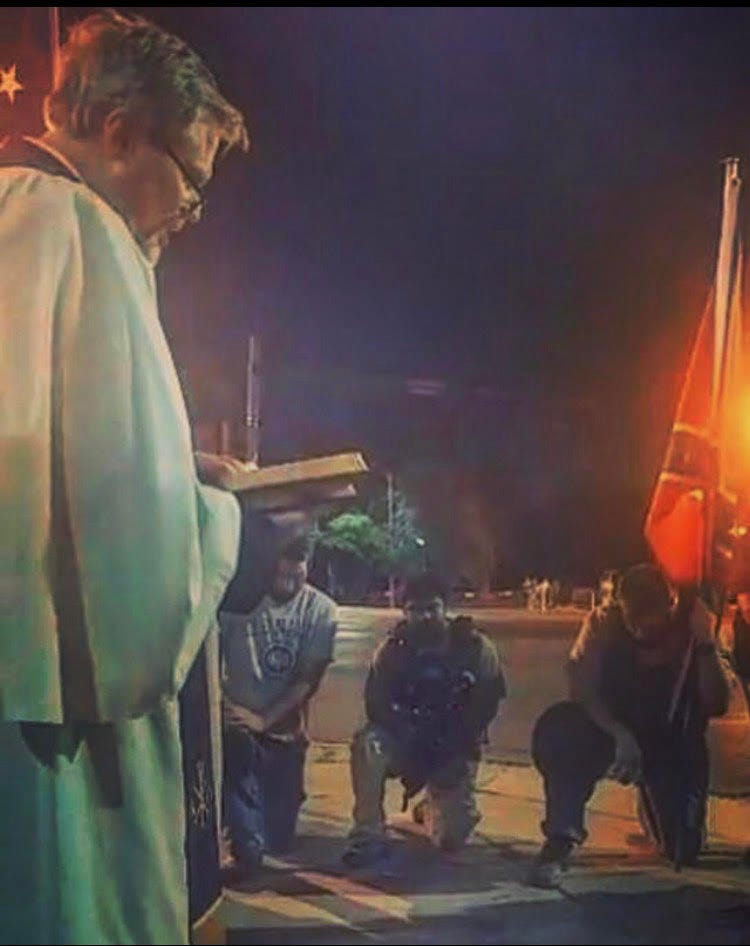


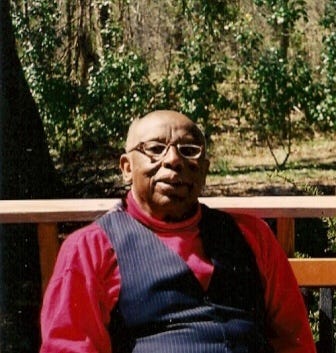

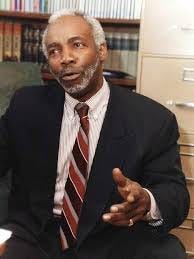
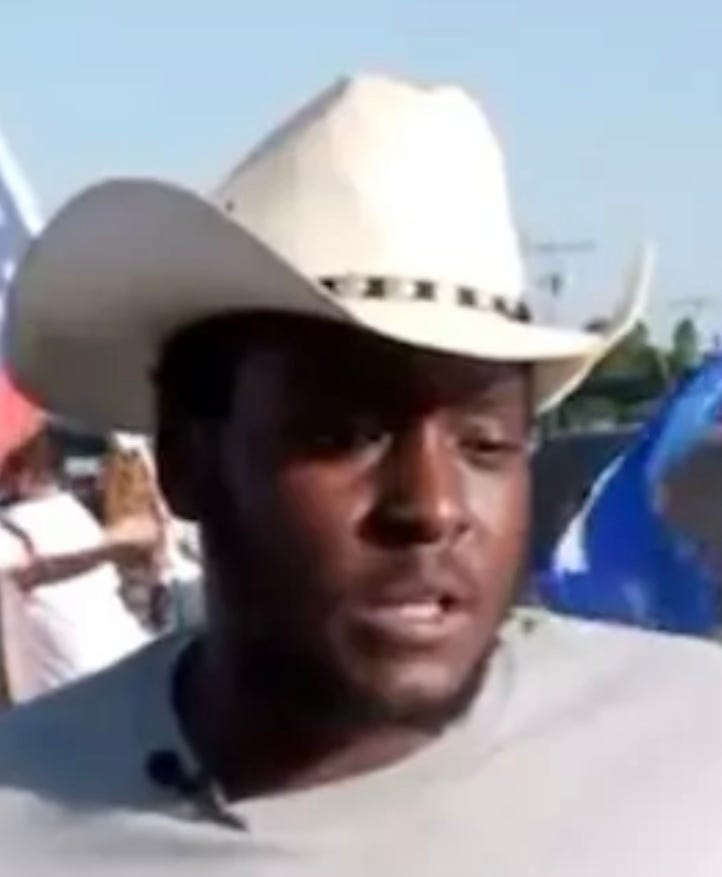
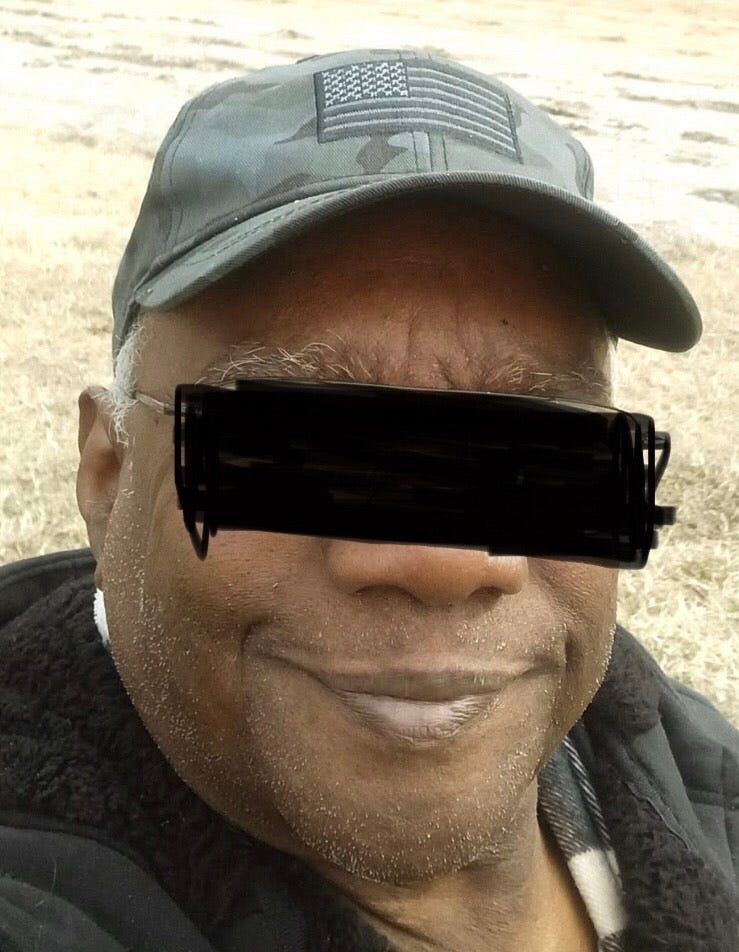



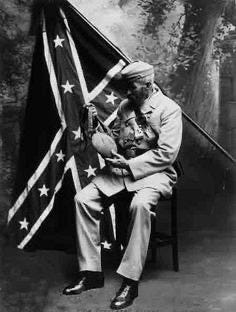

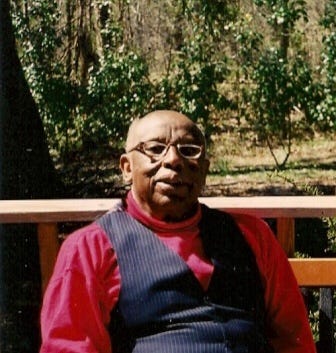

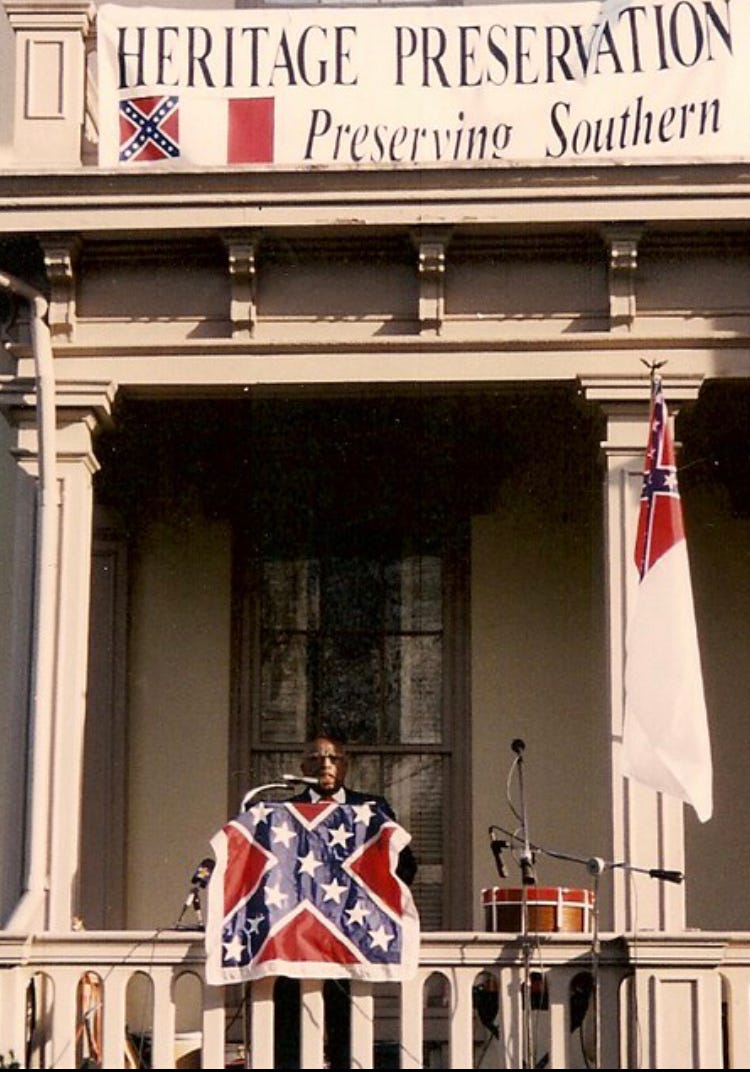


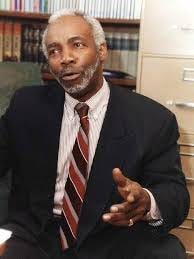
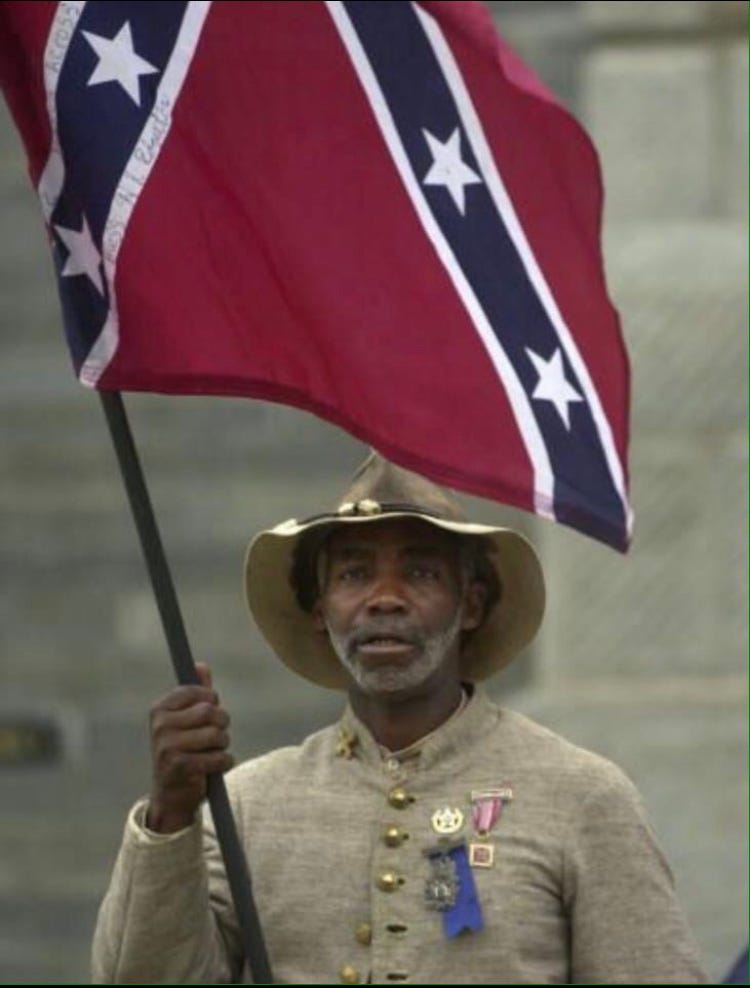

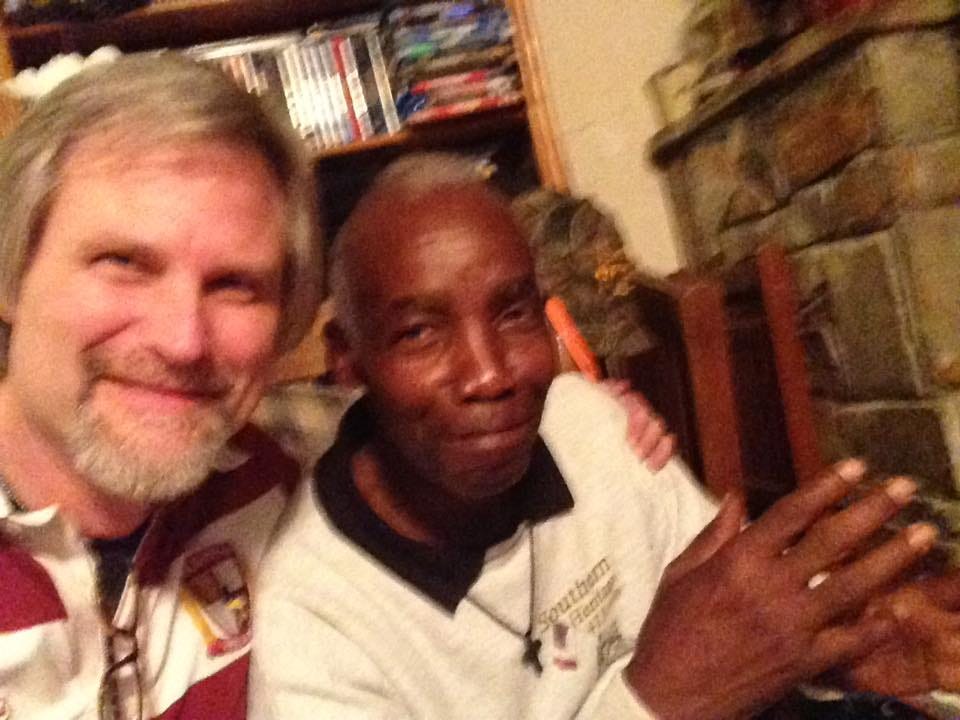




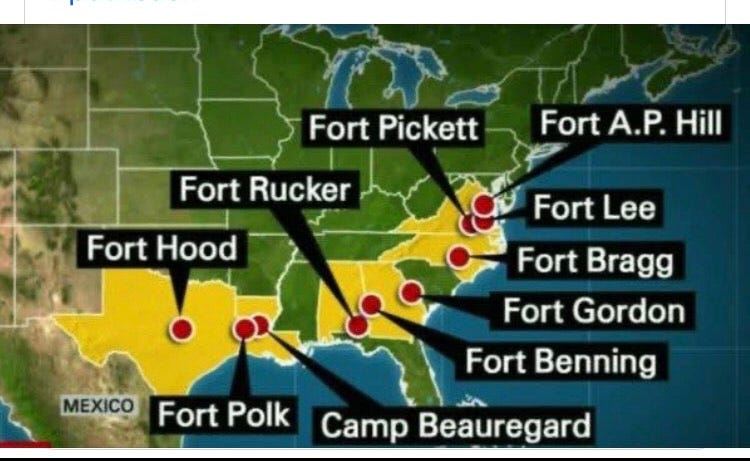

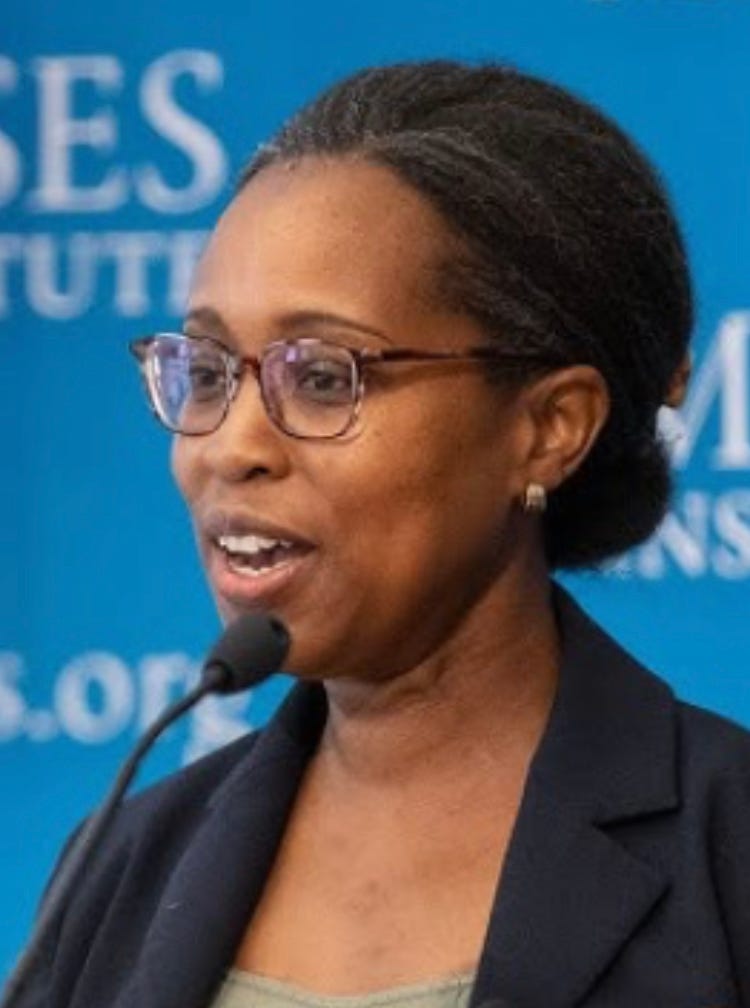
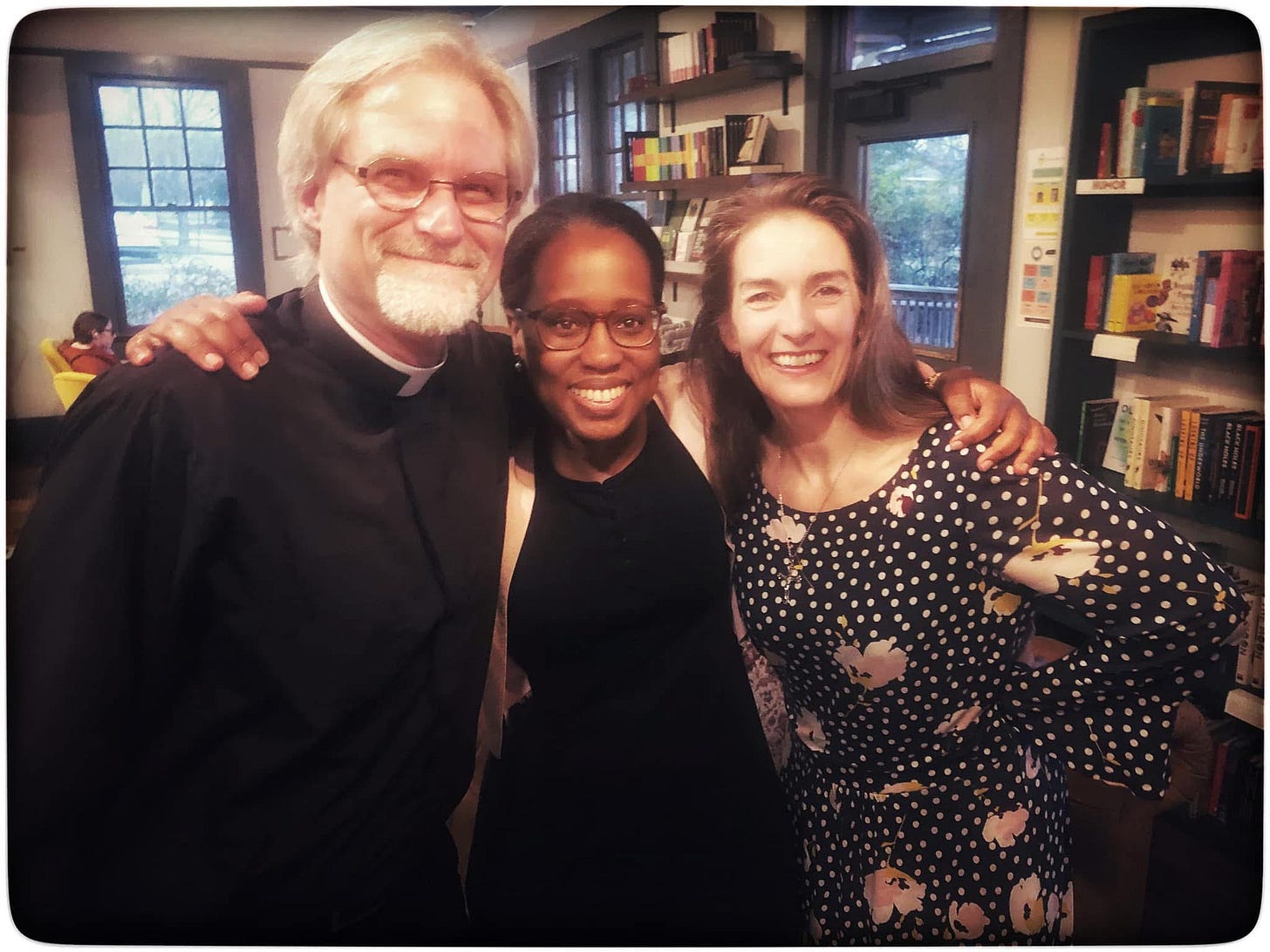
At my exit off US 85 flies the largest Confederate battle flag in South Carolina.
I salute it every time I go by.
It's insidious and evil to denounce anyone because of their ancestors. If the LCMS chooses to go down this road they'd better be careful, our High Priest has some shady forebearers: Tamar, Rahab, Ruth, and Bathsheba.